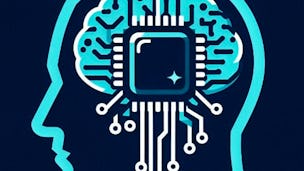The course "Applied Machine Learning: Techniques and Applications" focuses on the practical use of machine learning across various domains, particularly in computer vision, data feature analysis, and model evaluation. Learners will gain hands-on experience with key techniques, such as image processing and supervised learning methods while mastering essential skills in data pre-processing and model evaluation.

Applied Machine Learning: Techniques and Applications

Applied Machine Learning: Techniques and Applications
This course is part of Applied Machine Learning Specialization

Instructor: Erhan Guven
2,113 already enrolled
Included with
12 reviews
Recommended experience
What you'll learn
Understand and implement machine learning techniques for computer vision tasks, including image recognition and object detection.
Analyze data features and evaluate machine learning model performance using appropriate metrics and evaluation techniques.
Apply data pre-processing methods to clean, transform, and prepare data for effective machine learning model training.
Implement and optimize supervised learning algorithms for classification and regression tasks.
Skills you'll gain
- Data Processing
- Model Evaluation
- Data Preprocessing
- Machine Learning
- Image Analysis
- Data Manipulation
- Data Integration
- Machine Learning Algorithms
- Data Cleansing
- Classification Algorithms
- Scikit Learn (Machine Learning Library)
- Feature Engineering
- Computer Vision
- Applied Machine Learning
- Supervised Learning
- Predictive Modeling
- Skills section collapsed. Showing 10 of 16 skills.
Details to know

Add to your LinkedIn profile
12 assignments
See how employees at top companies are mastering in-demand skills

Build your subject-matter expertise
- Learn new concepts from industry experts
- Gain a foundational understanding of a subject or tool
- Develop job-relevant skills with hands-on projects
- Earn a shareable career certificate

There are 4 modules in this course
Discover the foundational principles and practical applications of machine learning as you delve into specialized topics such as computer vision. This course combines theoretical insights with practical lab activities through hands-on modules, covering essential concepts including data pre-processing, feature extraction, dataset management, supervised learning and classification techniques, and model evaluation. You will learn to implement and assess various machine learning models, providing a comprehensive introduction that will equip you with the essential skills to apply machine learning to visual data.
What's included
5 videos4 readings3 assignments1 ungraded lab
Explore essential techniques in data feature analysis and model evaluation critical to effective machine learning applications. Learn to identify, preprocess, and integrate datasets from diverse sources like UCI KDD and Kaggle. Gain hands-on experience with the Weka framework for data preprocessing and classification, and understand evaluation metrics including Receiver Operating Characteristic curves. By the end of this module, you'll grasp the nuances of model overfitting and strategies to optimize model performance.
What's included
7 videos2 readings3 assignments1 ungraded lab
Master the essential techniques of data pre-processing to enhance machine learning model performance. This module covers the foundational aspects of data cleaning, various data formats, and processing methods. You'll delve into advanced topics like discretization, data transformation, and reduction techniques. By the end of this module, you'll be adept at engineering data features, applying feature selection, and refining datasets for optimal machine learning outcomes.
What's included
5 videos1 reading3 assignments1 ungraded lab
Delve into the core principles and mathematical foundations of supervised learning algorithms. This module covers essential techniques, including the Perceptron algorithm, Naive Bayes classifier, and Linear Regression methods. You'll gain practical experience implementing and visualizing these algorithms, and explore how classifier decision boundaries shift with parameter changes. Additionally, learn to apply text classification using real-world datasets for hands-on understanding of supervised learning applications.
What's included
6 videos2 readings3 assignments1 programming assignment
Earn a career certificate
Add this credential to your LinkedIn profile, resume, or CV. Share it on social media and in your performance review.
Instructor

Offered by
Explore more from Machine Learning

Johns Hopkins University

Johns Hopkins University
Why people choose Coursera for their career

Felipe M.

Jennifer J.

Larry W.

Chaitanya A.
Learner reviews
- 5 stars
58.33%
- 4 stars
8.33%
- 3 stars
0%
- 2 stars
8.33%
- 1 star
25%
Showing 3 of 12
Reviewed on Jan 25, 2025
Brilliant course for learning advanced machine learning !

Open new doors with Coursera Plus
Unlimited access to 10,000+ world-class courses, hands-on projects, and job-ready certificate programs - all included in your subscription
Advance your career with an online degree
Earn a degree from world-class universities - 100% online
Join over 3,400 global companies that choose Coursera for Business
Upskill your employees to excel in the digital economy
Frequently asked questions
To access the course materials, assignments and to earn a Certificate, you will need to purchase the Certificate experience when you enroll in a course. You can try a Free Trial instead, or apply for Financial Aid. The course may offer 'Full Course, No Certificate' instead. This option lets you see all course materials, submit required assessments, and get a final grade. This also means that you will not be able to purchase a Certificate experience.
When you enroll in the course, you get access to all of the courses in the Specialization, and you earn a certificate when you complete the work. Your electronic Certificate will be added to your Accomplishments page - from there, you can print your Certificate or add it to your LinkedIn profile.
Yes. In select learning programs, you can apply for financial aid or a scholarship if you can’t afford the enrollment fee. If fin aid or scholarship is available for your learning program selection, you’ll find a link to apply on the description page.
More questions
Financial aid available,

